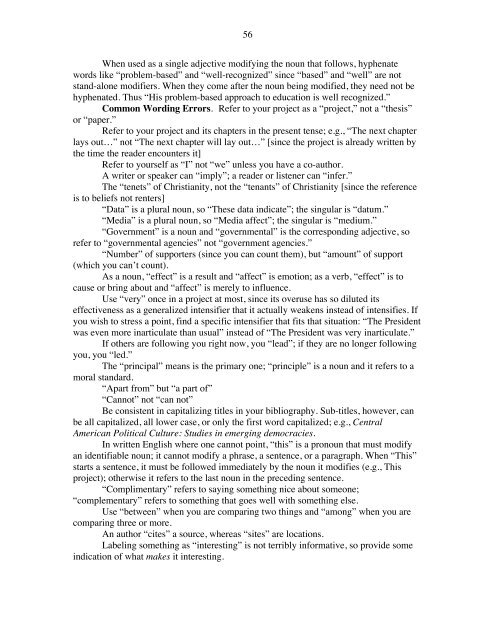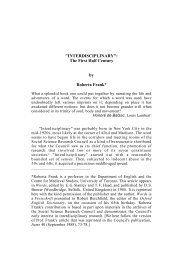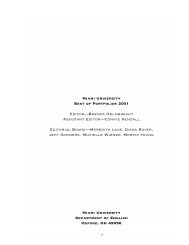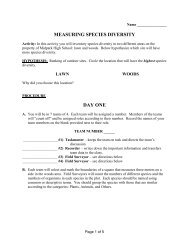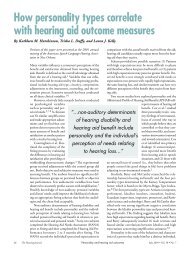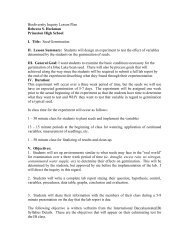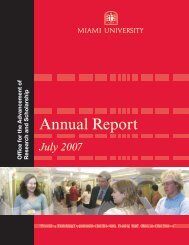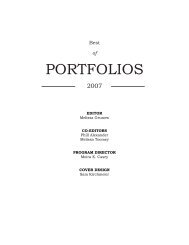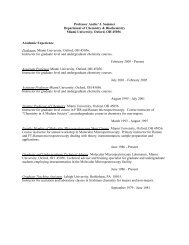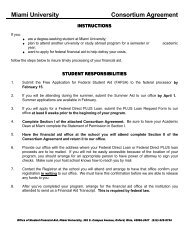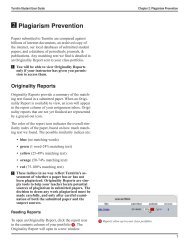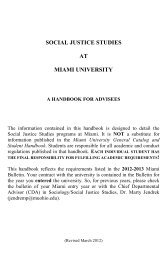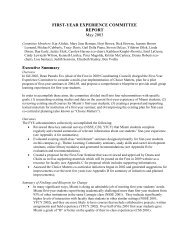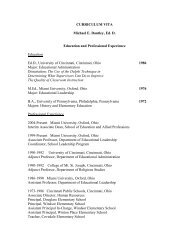Interdisciplinary Research Manual - Units.muohio.edu
Interdisciplinary Research Manual - Units.muohio.edu
Interdisciplinary Research Manual - Units.muohio.edu
You also want an ePaper? Increase the reach of your titles
YUMPU automatically turns print PDFs into web optimized ePapers that Google loves.
56<br />
When used as a single adjective modifying the noun that follows, hyphenate<br />
words like “problem-based” and “well-recognized” since “based” and “well” are not<br />
stand-alone modifiers. When they come after the noun being modified, they need not be<br />
hyphenated. Thus “His problem-based approach to <strong>edu</strong>cation is well recognized.”<br />
Common Wording Errors. Refer to your project as a “project,” not a “thesis”<br />
or “paper.”<br />
Refer to your project and its chapters in the present tense; e.g., “The next chapter<br />
lays out…” not “The next chapter will lay out…” [since the project is already written by<br />
the time the reader encounters it]<br />
Refer to yourself as “I” not “we” unless you have a co-author.<br />
A writer or speaker can “imply”; a reader or listener can “infer.”<br />
The “tenets” of Christianity, not the “tenants” of Christianity [since the reference<br />
is to beliefs not renters]<br />
“Data” is a plural noun, so “These data indicate”; the singular is “datum.”<br />
“Media” is a plural noun, so “Media affect”; the singular is “medium.”<br />
“Government” is a noun and “governmental” is the corresponding adjective, so<br />
refer to “governmental agencies” not “government agencies.”<br />
“Number” of supporters (since you can count them), but “amount” of support<br />
(which you can’t count).<br />
As a noun, “effect” is a result and “affect” is emotion; as a verb, “effect” is to<br />
cause or bring about and “affect” is merely to influence.<br />
Use “very” once in a project at most, since its overuse has so diluted its<br />
effectiveness as a generalized intensifier that it actually weakens instead of intensifies. If<br />
you wish to stress a point, find a specific intensifier that fits that situation: “The President<br />
was even more inarticulate than usual” instead of “The President was very inarticulate.”<br />
If others are following you right now, you “lead”; if they are no longer following<br />
you, you “led.”<br />
The “principal” means is the primary one; “principle” is a noun and it refers to a<br />
moral standard.<br />
“Apart from” but “a part of”<br />
“Cannot” not “can not”<br />
Be consistent in capitalizing titles in your bibliography. Sub-titles, however, can<br />
be all capitalized, all lower case, or only the first word capitalized; e.g., Central<br />
American Political Culture: Studies in emerging democracies.<br />
In written English where one cannot point, “this” is a pronoun that must modify<br />
an identifiable noun; it cannot modify a phrase, a sentence, or a paragraph. When “This”<br />
starts a sentence, it must be followed immediately by the noun it modifies (e.g., This<br />
project); otherwise it refers to the last noun in the preceding sentence.<br />
“Complimentary” refers to saying something nice about someone;<br />
“complementary” refers to something that goes well with something else.<br />
Use “between” when you are comparing two things and “among” when you are<br />
comparing three or more.<br />
An author “cites” a source, whereas “sites” are locations.<br />
Labeling something as “interesting” is not terribly informative, so provide some<br />
indication of what makes it interesting.


